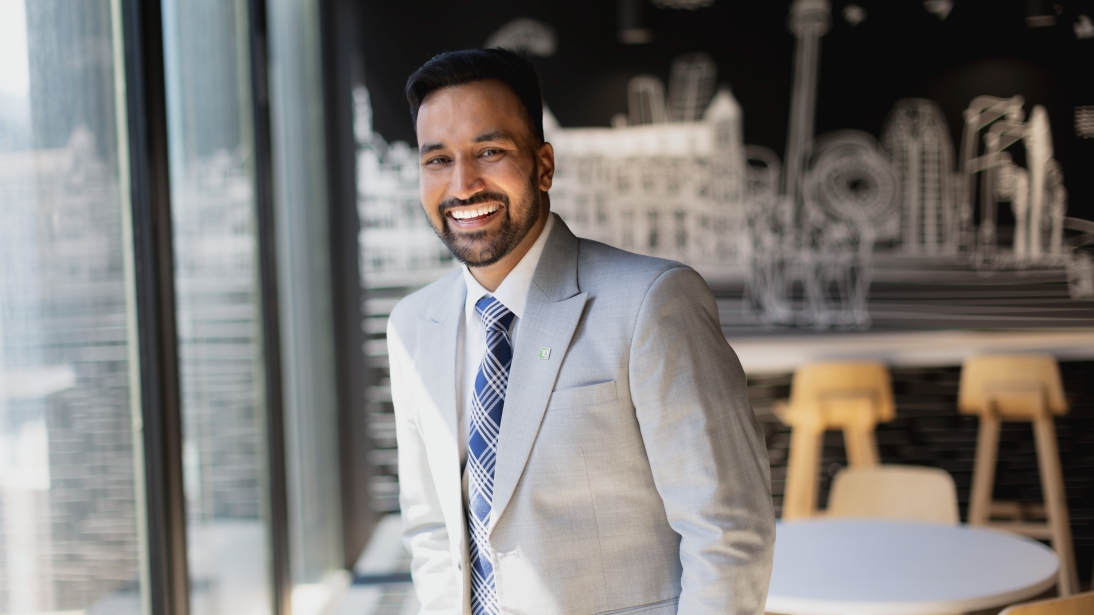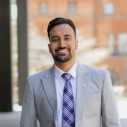I never felt alone as a child.
Growing up in the small village of Pandori Gola in Punjab, India, I was part of a tight-knit community where everyone knew each other. It felt like we were all one big extended family.
But I was a curious kid with big dreams and was eager to carve out my own path outside my village. I dreamed of travelling the world, studying abroad, and working in a big city. So, when I turned 18, I moved to Canada to study as an international student.
As excited as I was to be on my own for the first time, it was a big change for me. I was all alone in a new country. I didn't know how to speak English that well. For a long time, I experienced culture shock and felt a lot of pressure to adapt as a newcomer. I developed anxiety and I felt a tremendous amount of responsibility to settle, be successful, and eventually take care of my parents back home financially.
Years later, with a lot of hard work and determination, I became the first in my family to graduate post-secondary school. It was a proud moment for me and my parents. But the pressure and stress continued to take a major toll on my mental health. I did my best to stay strong. I buried my emotions to cope. I was struggling, but no one knew – not even my parents.
I kept pushing on, not realizing things were about to get worse.
The pandemic and reaching my breaking point
I joined TD in February 2020. While I was new to the financial services industry and felt anxious about entering banking for the first time, I had landed my desired job in an organization that I had my sights on since I first stepped off the plane in Canada.
Then, a month into my new role, I tested positive for COVID-19. The pandemic had just started. No one knew what to do or what was going to happen as we headed into lockdowns. I wasn't prepared to get sick so soon after embarking on my new career.
My feelings of anxiety intensified, and I started to question everything. I didn't know when I was going to get better. I was scared about being sick and losing the job I had worked so hard for. Having to ask for time off work to recover from COVID-19 was stressful, and I was nervous to approach my leaders with my concerns.
But after I talked to them, I felt a huge sense of relief. It turned out my leaders were very supportive and encouraged me to take the time off I needed to get better.
Still, like many Canadians, as the pandemic and lockdowns continued, I felt the isolation and stress affect my mental health once again. I worried a lot. It felt like there was going to be no end to the global health crisis. Things were also starting to unravel in my personal life. I couldn't focus. I felt alone and didn't have anyone to turn to. I found myself missing the sense of community I had back home.
At one point, I wanted to resign from work because I felt so overwhelmed. I wasn't convinced that I needed counselling or therapy as I thought no one would understand what I was going through. Growing up, seeking help for mental health wasn’t normalized in my family or community – we just never talked about it. I believed it was considered weak to talk about your feelings, so I stayed silent. I smiled on the outside, even though I was hurting on the inside.
But deep down, I knew that I wouldn’t be able to hide my struggles for much longer and thought maybe it was finally time to try something else.
Getting support for my mental well-being
My mental health was at a point where it was impacting my well-being and daily work. Because it had reached this point, I eventually gathered the courage to talk to my leaders at TD about what I was going through. I was so grateful that my leaders showed up for me during this challenging time and encouraged me to seek professional help. Going to counselling was the first big step towards my healing.
Recovery wasn't an overnight journey, and it’s something I continue to work on. I started by focusing on small steps to improve my mental health each day. I began working out, meditating, and spending time outdoors. I also used the TD Employee and Family Assistance Program (EFAP) and the TD Well-being app to better manage my well-being. I learned looking after my mental health is just as important as my physical health.
One of the key factors that played a crucial role in my recovery was when my manager at the time introduced “Wellness Wednesdays” as a way of bringing the team together on a weekly basis to have conversations about mental health.
Slowly, I began opening up to my teammates about my mental health journey. The support was overwhelming. I learned that everyone in their life is fighting some battle – and sharing stories and talking about our deeply personal experiences made me feel less alone. I realized that I wasn't the only one going through a difficult time. Through these conversations, we became each other's safe spaces. I felt like I had found that sense of community I'd been searching for.
Deciding to talk about my mental health battles publicly wasn’t an easy decision, but I feel it’s the right thing to do and it’s helped me so much. The more we talk about mental health and normalize our struggles, the easier it becomes for others to share and get the support they need.
These days, I always encourage people to talk to their loved ones and not keep it all to themselves.
It's okay to not be okay sometimes.
Being a part of this special community of colleagues has made me realize that TD is not just a brand, a bank, or an employer. The caring people and leaders here are what makes this culture so unique. It is an organization that has always supported me and had my back in times of need.
Just like my village back home in India, I have found a community here that I connect with and can depend on – and one that reminds me I am never alone.

